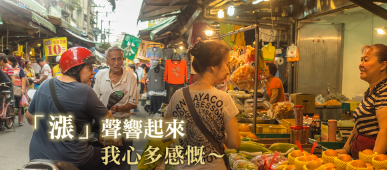inflation
inflation是从动词inflate变化而来,inflate有「使充气、使膨胀」的意思,而inflation指的就是「通货膨胀」,当一般物价水准在某一时期内,连续性地以相当的幅度上涨,或是等值的货币,其购买力持续性的下滑,都称作通货膨胀;相反的,「通货紧缩」则是deflation。
The rate of inflation in UK hits new high in 40 years as food and energy price surge persists.
(由于食品和能源价格持续攀升,英国的通货膨胀率达40年来的新高。)

consumer price index
consumer price index是「消费者物价指标」,简称CPI,是衡量通货膨胀的主要指标之一,也是各国央行制订货币政策的重要观察数据。名词index一般指的是书本最后的「索引」,但用在经济学上,则有「指数、指标」的意思,例如:道琼指数(the Dow Jones Index)。
It is said that the electricity rate adjustment could slightly raise Taiwan’s consumer price index this year.
(据说调整电费可能会小幅提升台湾今年的消费者物价指数。)
raise vs rise
大家常常会混淆这两个动词,它们最大的不同就是,前者是及物动词,也就是说后面要接受词,后者则是不及物动词。 raise有「举起」或「养育」的意思,例如:Please raise your hand.(请举起你的手),He was raised by his grandmother.(他是由祖母抚养长大的)。此外raise和rise都可用在提高价格、价格上涨的意思,只是用法因词性有些许不同,请看下面的例句:
The government decided to raise gas prices.
(政府决定提高汽油价格。)
Gas prices have been rising three months in a row.
(汽油价格已连续三个月上涨了。)
tighten your belt
动词tighten意思是「使变紧、拉紧」,tighten your belt这个俚语就如同字面上所指的「勒紧你的腰带」,也就是我们常说的「勒紧裤带、省吃俭用」的意思。在万物齐涨的日子,大家是否都得省吃俭用呢?
He has to tighten his belt because he is unemployed at the moment.
(他必须勒紧裤带过日子,因为他现在失业了。)







